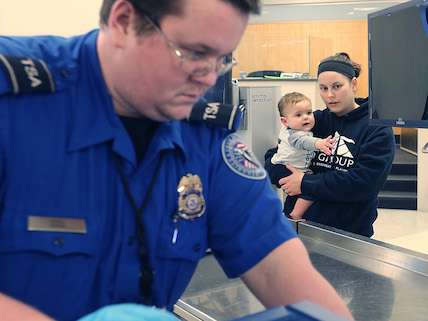United Did a Bad Thing, But the TSA Has 'Re-Accommodated' Airline Passengers for Years
This horrific incident is a reminder that flying is miserable because safety paranoia overshadowed human rights.

The latest wrinkle in the United debacle is that the airline's CEO, Oscar Munoz, sent a letter to company employees laying most of the blame on the victim: the doctor who was dragged off his flight by Chicago aviation police. This passenger "defied" officers after being "politely asked to deplane" and became "disruptive and belligerent," according to the letter.
Munoz struck a similar tone in his public statement, which claimed that United personnel were merely trying to "re-accommodate" the passenger—an example of Orwellian doublespeak if ever there was one.
In the wake of the incident, United has been met with something approaching universal condemnation—and it's well-deserved, writes Reason's Brian Doherty: "Shame on both United for calling the cops on a passenger to make the lives of their employees and business easier, and shame on the police for having any part of it."
He's right, of course. But while United's treatment of the passenger in the video was stunning and uniquely awful, let's not forget that the entire airport experience is oriented toward misery—and that's the fault of government policies that treat every passenger like a potential security threat. Paying customers aren't people with rights and dignity, according to this model: they are nails to be hammered into place.
We live in an age of transportation security theater, and the party responsible for much of the flying-related misery is the Transportation Security Administration. Created in response to the 9/11 terrorist attacks, this federal agency is solely responsible for screening passengers for contraband and dangerous items as they enter airport terminals. In practice, this means subjecting people to intrusive pat-downs and body scans while rifling through their personal items. There is no boundary too private for the TSA to cross. That this incredibly inconvenient, dehumanizing system routinely fails to prevent illicit items from actually entering the airport is almost beside the point, since the TSA provides little actual security. Indeed, the dirty secret of airport safety is that the materials necessary to construct an explosive can be found inside the terminal, beyond the security checkpoint.
Making matters more frustrating, the TSA habitually touts its own importance—even though, as Reason's Ron Bailey and C.J. Ciaramella, and Vox's Dylan Matthews, have argued, its complete abolition would put no one in danger and might actually save lives. As customers wait in endless security lines, TSA agents incessantly claim that the extraordinary measures are necessary precautions. Constant reminders to remove shoes and belts, empty pockets, and separate laptops from backpacks are justified on grounds that they make everyone safer, even though this is a lie.
United's claim that assaulting a passenger and dragging him out of a seat he paid for constitutes mere "re-accommodation" is a clear continuation of this approach. Agents of the state make similar re-accommodations all the time. For your safety. You are welcome.
United is not the TSA. And many airlines have better customer service track records than United. But it's no accident that flying has become one of the most stressful and uncomfortable recurring experiences for millions of Americans. It's the result of policy choices, enacted by government agents, and propelled by overwhelming safety paranoia. Until and unless some basic level of sanity prevails, customers should expect further "re-accommodations" at the hands of overzealous police officers and security officials, no matter which airline they fly.
